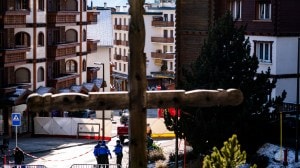Disquiet coloured red
As the Maoists come closer to forming the government, almost two months after the poll results were out, an uneasy...

As the Maoists come closer to forming the government, almost two months after the poll results were out, an uneasy fear sweeps across Nepal that the new rule will be totally authoritarian. There will be no resistance, at least at the institutional level, to whatever the Maoists may want to do. Having removed the monarchy without following any norms and rules in the constituent assembly, the Maoists now want to ensure that the Nepal Army, with a strength of 93,000, is totally under their control. They are not willing to accommodate the leader of the opposition as a member in the security council which will be headed by the prime minister alongwith the defence, home and finance ministers 8212; all likely to be from the Maoist party 8212; as members. The council8217;s recommendation will be binding on the government on deployment and other issues related to the army.
The demoralisation that the army will suffer will be enormous as the Maoists and the Nepal Army fought a bitter war for five years during the insurgency. Prachanda, in his first press conference after he surfaced over ground, said on June 2, 2006 that the Nepal Army is nothing but a loyal force to the king which is full of 8216;rapists and corrupt8217; people.
There is no evidence to suggest that he or his opinion has changed. And the Nepali Congress, especially Prime Minister G.P. Koirala, is playing on the fear and sentiment of the army. While Prachanda as prime minister will be in overall command of the Nepal Army, he also continues as the supreme commander of the Peoples Liberation Army PLA that has about 19,000 verified 8216;combatants8217; whose integration in the Nepal Army will be a priority for the new government.
A security council without anyone from the non-Maoist parties will give absolute power to the government to settle the issue even if that means further humiliating and demoralising the Nepal Army. The revolt in two units of the Armed Police Force APF 8212; the only para-military force in the country 8212; has further injected fear in the minds of the non-Maoist parties and the army that the Maoists have already been able to penetrate the security outfit. They fear that handing over the army to the Maoists may trigger such revolts, and engineering them will be much easier especially after the Maoist combatants get entry there.
G.P. Koirala8217;s over confidence that the Nepali Congress would emerge as the largest party in the CA poll and that he would automatically continue as prime minister is at the root of the situation. The reality is the Maoists have emerged as the single largest party, although without a simple majority. However, with major parties like the Nepali Congress and the Communist Party of Nepal-Unified Marxist Leninist CPN-UML considering not joining the government, the Maoists might enjoy total control. It will be easier for the Maoists to bypass or ignore the constituent assembly, as in the past two years.
In the name of the politics of consensus, the executive under Koirala8217;s leadership has been able to treat the legislature as a rubber stamp. The Maoists, as the government, will have that convenient precedent to follow. The monarchy and the Nepal Army, no doubt, were feared as the most powerful institutions that could offer resistance to the Maoists8217; march to absolute power. But with the king gone and the army demoralised, the next targets obviously will be the media and judiciary. The Maoists8217; key ideologue, Mohan Baidya, has already stated that his party, once in government, will define a new model of media freedom. And the apex court is visibly demoralised already.
The international community is watching the situation cautiously. Of all the countries, China and North Korea appear the happiest with the prospects of total control by the Maoists. The United Kingdom, United Nations Mission to Nepal UNMIN and Norway have offered assistance to the integration PLA into Nepal Army process while India which has so far been for the Maoists forming the government, now appears apprehensive about the prospect of complete control of the army by the ex-rebels.
Given the fact that a large number of 8216;Gorkhas8217; serve in the Indian Army and it has traditionally friendly relations with the Nepal Army, the latter8217;s feared transformation literally into a red-guard is something that may not send a comfortable message to India, especially in a situation where the Maoists are spreading fast in nearly 200 districts spread over 15 states of the country. The US position is no different.
But the Maoists have so far succeeded in attracting popular sympathy in the country as the political victim, prevented from forming the government despite emerging as the largest party. The international forces and their 8216;domestic puppets8217; are of course being blamed for this 8216;denial8217;. The Maoists8217; message is simple 8212; we will take power, and on our terms.
ghimire.yubarajgmail.com
- 01
- 02
- 03
- 04
- 05































